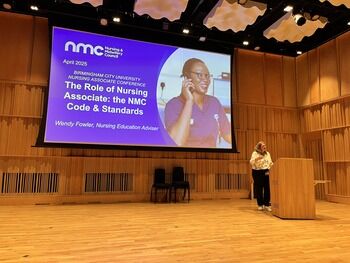University News Last updated 28 April

Nursing associates are central to the future of the NHS in England, making it vital that their role is properly understood, according to a healthcare expert at ̽��ֱ�� (BCU).
“There is often confusion surrounding the nursing associate role, primarily due to its similarities with the registered nurse,” said Erin McKenzie, senior lecturer and deputy course lead for BCU’s��nursing associate programme.
“This needs to change. By 2033, nursing associates will be a core part of the NHS workforce, supporting nurses and helping to ensure a sustainable, well-trained staff.”
To address misconceptions and raise awareness, Erin organised the National Nursing Associates Conference at BCU.
“This conference was unique in that it was developed by nursing associates, for nursing associates, ensuring it remained relevant, impactful, and reflective of the profession’s needs,” she said.
“It focused on the development of the role and the evolving responsibilities of nursing associates within the healthcare system.”
Held at Royal ̽��ֱ�� Conservatoire on Wednesday 23 April, the conference brought together speakers and attendees to discuss key challenges facing nursing associates — including role clarity and access to continuing professional development (CPD).
“There’s a lot of conversation around how the role is embedded, as scopes of practice vary from trust to trust,” said keynote speaker Professor Claire Thurgate, head of the School of Nursing at Kingston University.
“Even though the role is regulated by the Nursing and Midwifery Council (NMC), this variation causes confusion. More research is needed.”
Nursing associate Sheri Lawrence shared her experience during a panel discussion, explaining that, even after qualifying more than two years ago, she still has to explain her role to colleagues.
“We have to use our own voice and champion our role,” said Sheri.
There are currently more than 5,500 nursing associates working in the NHS — many trained by BCU — across all four fields of nursing: adult, children’s, mental health, and learning disability.
They work alongside healthcare support workers and registered nurses to deliver patient care. The NHS plans to double the number of nursing associate training places by 2031.
“Nursing associates are a key component of the NHS Long Term Workforce Plan, which addresses workforce shortages, supports career progression, and aims to improve patient care,” said Erin.
“Expanding the workforce is crucial to meeting rising healthcare demands.”
Launched in 2023, the national nursing associate conference was designed to celebrate the impact of the role. This year, it expanded to include workshops aimed at supporting professional development.
Wendy Fowler, NMC nursing education adviser, also spoke at the event.
“Nursing associates successfully bridge the gap between healthcare assistants and registered nurses,” she said.
“Across England, they are valued members of multidisciplinary teams, delivering high-quality care every day.”
She also emphasised the importance of CPD: “Ongoing development opportunities, supported by employers, are essential to help nursing associates reflect, grow, and continue delivering excellent care.
“It’s also crucial that they work in environments that support their wellbeing and professional success.”